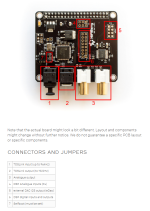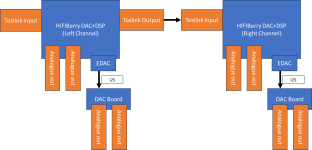Hi,
Can the HifiBerry DAC+DSP do 4 way crossover? It has a dedicated DSP (the RPi below the board has no role in audio, which is good actually).
Below are the board details. The board has 2 RCA outputs and looks like we can use eDAC connector to add another external stereo DAC to make 4 outputs for lets say a 4 way DSP enabled speaker, one channel of course, lets say the left.

Below I propose that using another such RPi/Hifiberry DAC+DSP set we can route the same SPDIF to to the second board and get 4 way out same way. So now we have 4 way stereo DSP system. No latency issues at all.
Can somebody confirm that
a) Is this possible?
b) then which board to use as a external DAC?
c) and how to make sure RCA are enabled as well as eDAC is enabled simultaneously in both the HIFIBerry DAC+DSP boards? ie how to make it a 4 way system?

Warm Regards,
WonderfulAudio
Can the HifiBerry DAC+DSP do 4 way crossover? It has a dedicated DSP (the RPi below the board has no role in audio, which is good actually).
Below are the board details. The board has 2 RCA outputs and looks like we can use eDAC connector to add another external stereo DAC to make 4 outputs for lets say a 4 way DSP enabled speaker, one channel of course, lets say the left.
Below I propose that using another such RPi/Hifiberry DAC+DSP set we can route the same SPDIF to to the second board and get 4 way out same way. So now we have 4 way stereo DSP system. No latency issues at all.
Can somebody confirm that
a) Is this possible?
b) then which board to use as a external DAC?
c) and how to make sure RCA are enabled as well as eDAC is enabled simultaneously in both the HIFIBerry DAC+DSP boards? ie how to make it a 4 way system?
Warm Regards,
WonderfulAudio
Attachments
As far as I can tell (I do not own this HAT) there are only 2 audio channels from the on-board SPDIF and analog outputs (possibly these are just duplicates of each other). The board has a header with I2S signals, (the connector labeled "5") probably from other DAC channels on the HAT, but these are not all that useful without some serious work.
@CharlieLaub, Do you know any board I could do it? I ask you because there are many companies having DSP boards.
Warm Regards,
WonderfulAudio
Warm Regards,
WonderfulAudio
If you need toslink input and output plus a couple of analog outputs so that you can make a 4-way or greater crossover, then my advice is to use a USB audio interface that has toslink inputs and outputs and not a HAT. I do not know of a HAT or "board" that will do all of these together (digital I/O plus at least 4 analog output channels). You could try to combine the HiFiBerry DAC8x HAT with some sort of USB digital I/O but then you might as well just do everything via USB. The DSP would be done in software on the computer (e.g. Pi or whatever small and cheap Linux box you want to use) and not on the "board".


